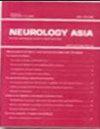Clinical exome sequencing reveals an important role for clinical diagnosis of intellectual disability with definition of seven novel variants
IF 0.2
4区 医学
Q4 CLINICAL NEUROLOGY
引用次数: 0
Abstract
Intellectual disability can be defined as a significantly below-average general mental function, accompanied by environmental adaptation and behavioural deterioration. Patient files of 87 children with intellectual disability were evaluated in this study. After clinical exclusion criterias, clinical exome sequencing was performed for 25 of 87 intellectual disability cases with a massively parallel targeted sequencing method. Seventeen variants in the genes MBOAT7, KDM5C, TUBB3, MAN1B1, GFAP, CACNA1A, BCOR, LMNA, LBR, ALS2, ENPP1, UBE3A, TRAPPC9, HSPG2, AFF2, NLGN4, and SOX10 were identified in 14 of 25 patients (56%). Seven of the 17 variants (41.1%) were novel in the genes KDM5C, BCOR, UBE3A, TRAPPC9, AFF2, NLGN4, and SOX10. Seven cases (7/25, 28%) had a definite diagnosis of intellectual disability with their pathogenic variants. The high rate of variant detection (56%) in the current study shows that multiple gene analysis plays an essential role in diagnosing the uncertain etiology of intellectual disability. This study also presents seven novel variants, which are first reported.临床外显子组测序发现七种新型变异,对智力残疾的临床诊断具有重要作用
智力障碍可定义为一般智力功能明显低于平均水平,并伴有环境适应和行为退化。本研究评估了 87 名智障儿童的患者档案。根据临床排除标准,采用大规模平行靶向测序方法对 87 例智障病例中的 25 例进行了临床外显子组测序。在 25 例患者中的 14 例(56%)中发现了 MBOAT7、KDM5C、TUBB3、MAN1B1、GFAP、CACNA1A、BCOR、LMNA、LBR、ALS2、ENPP1、UBE3A、TRAPPC9、HSPG2、AFF2、NLGN4 和 SOX10 等基因的 17 个变异。17 个变异中有 7 个(41.1%)是 KDM5C、BCOR、UBE3A、TRAPPC9、AFF2、NLGN4 和 SOX10 基因的新变异。有 7 个病例(7/25,28%)的致病变异明确诊断为智力残疾。本研究中变体的高检出率(56%)表明,多基因分析在诊断不确定病因的智力残疾中起着至关重要的作用。本研究还首次报道了 7 个新型变异基因。
本文章由计算机程序翻译,如有差异,请以英文原文为准。
求助全文
约1分钟内获得全文
求助全文
来源期刊

Neurology Asia
CLINICAL NEUROLOGY-
CiteScore
0.30
自引率
0.00%
发文量
76
审稿时长
>0 weeks
期刊介绍:
Neurology Asia (ISSN 1823-6138), previously known as Neurological Journal of South East Asia (ISSN 1394-780X), is the official journal of the ASEAN Neurological Association (ASNA), Asian & Oceanian Association of Neurology (AOAN), and the Asian & Oceanian Child Neurology Association. The primary purpose is to publish the results of study and research in neurology, with emphasis to neurological diseases occurring primarily in Asia, aspects of the diseases peculiar to Asia, and practices of neurology in Asia (Asian neurology).
 求助内容:
求助内容: 应助结果提醒方式:
应助结果提醒方式:


